The public hearing at Crowder College scheduled for June 8, 2005, by the Missouri Department of Natural Resources for anyone who wanted to comment on Moark/Land O’Lakes confined animal feeding operation (CAFO) expansion is history. The MDNR now has the task of coming up with answers to the myriad of questions put before them.
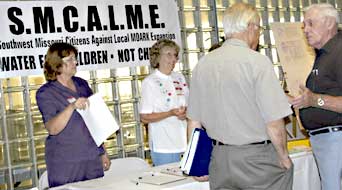
Members of the group opposing MoArk expansion held a prominent position in the area where people gathered before the formal hearing. Their booth offered passersby a pamphet describing their opposition as well as the opportunity to sign a petition supporting their position.
The atmosphere at the two-hour general availability hearing, before the period of actual recorded testimony, was cordial. But many people comparing notes afterward realized they were receiving no real substantive answers from MDNR representatives to their very specific concerns.The most cited response was that the new head of the MDNR, Doyle Childers, would not be strong on enforcement, but would be strong on fixing the problems. So, as an example, Childers would fix the problem of drunk driving and speeding but not issue fines and punishment. Doyle Childers'program, “Just Say No to Polluting,”expects that the factory farm operators will get an epiphany and follow all the rules.
During the public record portion of the hearing 48 people had signed up to testify. Not all spoke, but those questioning MoArk's expansion were looking for eventual answers and solutions not just rhetoric. Citizens from other states spoke as well--the downstream people, who ultimately will bear the burden of the CAFO pollution that will move from Missouri to Kansas and Oklahoma, via our springs, streams and rivers.
A curious species also attended the public hearing sessions proclaiming themselves to be for the Moark/Land O’Lakes expansion. This species identified themselves as corn farmers and agronomists. They spoke about the looming shortage of mined phosphorous fertilizer 50 years from now not realizing that there are untold acres of land in SW Missouri right now that have a hundred years' worth of phosphorous bound up in the soil due to generations of uncontrolled litter dispersement.
The species of farmers from SE Kansas spoke passionately in support of the CAFO expansion but did not express any desire to have that same CAFO and its side effects in their backyards. Afterall, 5 communities in both SE Kansas and NE Oklahoma shouted a resounding “NO.“ The farmers want their wallets filled but not their quality of life endangered. How could they speak against the arguments presented by the Southwest Missouri Citizens Against Local Moark Expansion and the Board of Trustees of Crowder College who also do not want the harmful side effects of accelerated ground water depletion, surface water contamination and a lowered quality of life?
A most unpleasant end to the evening came while a small group was standing outside Crowder's Elsie Plaster Community Center, the location of the hearing. The stench of rotting manure and dead chickens increased in intensity until everyone could taste it. Had MoArk kept the fans off until the hearing ended and almost all of its participants left? Sympathy for the students attending Crowder College was expressed.
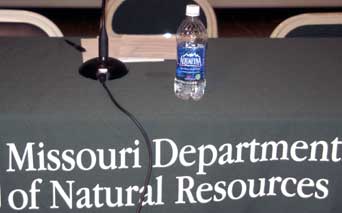
The audience at the public hearing regarding the MoArk CAFO permits was quite amused over seeing a bottle of water on the table where Kerry Cordray and Randy Kixsmiller, representatives of the Missouri Department of Natural Resources, planned to sit. We're all going to have to drink from one of those if MoArk's expansion is approved, Les Bond told James Dwyer, the hearing officer who sat between the MDNR officials.
Comments from the hearing, each expressed within 3 minutes - please email any missed comments or corrections-- ed.
Hugh Vogel - MoArk's by-products mgr. reinforced the role his company has played since 1965 and called it the area's largest employer with 335 employees. He said that the expansion would put $25 million into the local economy. He said they had a plan to reduce moisture in the litter, that they have an odor management plan, that they will release minimum levels of ammonia, and that they plan to sell 100% of the litter. He said the present Hathaway Farms operation would be closed by 2008.
James Tatum - He said that being heard apparently is not the same as being understood and that all the data presented seems to go in one ear and out the other. He commented that, although he wasn't an expert in hydrology, he was a practical person seeing how abuses have led to water shortages and that nothing was more precious than water. He called upon the wisdom of the almighty to get us out of deep trouble in the years ahead.
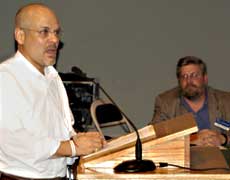 Rep. Kevin Wilson (R-Neosho-130) who had refused to take a stand against the MoArk expansion switched gears after hearing some of the complaints of his constituents. At the meeting, though, he took the podium to say that he wasn't commenting until after the hearing. A woman in the audience shouted for him to identify himself after he neglected to follow the procedure that was set up.
Rep. Kevin Wilson (R-Neosho-130) who had refused to take a stand against the MoArk expansion switched gears after hearing some of the complaints of his constituents. At the meeting, though, he took the podium to say that he wasn't commenting until after the hearing. A woman in the audience shouted for him to identify himself after he neglected to follow the procedure that was set up.
Rep. Kevin Wilson - He said he was going to defer making a public statement until after he had heard all the comments. That statement subsequently released to the media said that he thought a more thorough investigation was needed by the MDNR before an informed decision could be made regarding the CAFO expansion.
James R. Carter, Jr. - He questioned due process and thought that the Missouri attorney general should be more involved. He wanted to know how the 544 tons of manure per week would be stored during December, January, and February when it couldn't be spread on fields and how it would be monitored. He called for an onsite inspector paid for by MoArk scheduled 7 days a week.
Dr. Richard Betz - He handed over 1800 signatures [now has grown to over 2500] of people opposing the MoArk expansion to Randy Kixmiller, the MDNR CAFO representative. He called attention to MoArk's need for 225 million gallons of water yearly, or half of the needs of the City of Neosho. He mentioned MoArk's location in a losing setting, one with severe geological limitations. He questioned MoArk's right to self-testing and said that local citizens should be involved in the process. He suggested that MoArk build new houses for the chicken population they have now.
Rick Bussey - He said he was a resident of the area for 30 years. He called attention to problems with water testing and transport of manure. He wanted to know how much we need to spend repairing the Elk River before we say enough is enough.
Dwayne Miller - He wanted to know the exact capacity of the Roubidoux aquifer and called attention to a 400 foot drop in 40 years. He asked the DNR if they would fund well-drilling and testing necessitated by the constant drop of the water table that they were allowing. He wanted to know how the Stockton Lake ecology would be affected by spreading manure in the proposed area of northern Jasper County.
Wes Nall - He questioned the language in the permit that said MoArk shall STRIVE to move the litter. "why not just 'shall,'" he said. He asked the DNR to count the chickens MoArk has now, not trusting their figures.
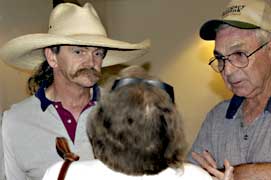 MDNR inspector George Parsons wearing his signature straw hat chats with concerned citizens. Parsons took the heat from several opponents to the MoArk expansion because they equate his long history with the MDNR with increased degradation of the environment.
MDNR inspector George Parsons wearing his signature straw hat chats with concerned citizens. Parsons took the heat from several opponents to the MoArk expansion because they equate his long history with the MDNR with increased degradation of the environment.
Jill Carter - She called upon the DNR to hire the services of a third party qualified to assess the geological issues and that an inspection be made of all MoArk storage pits regarding outfall, safety volume and construction. She asked for the regular monitoring of all streams by an independent expert as to levels of nitrates and fecal chloroform levels.
Christine Betz- Because she and her husband are losing water pressure and anticipate that their well will run dry, she wanted to know who was responsible for insuring water rights for all people and wanted to know why a project would be approved that added to the loss of water.
Mark Adams - He called for an audit of MoArk's birds. He wanted to know why George Parsons did not follow the mandate to inspect the wells once per month.
Lee Vanderloo -- He said that the facilities called for by MoArk's expansion plans should not be compared to MoArk's operation in Roggen, Colorado. He visited Roggen and said that the area has sparser population, an adequate source of water, and is surrounded by the farms that can absorb the litter.
Gary Kinney - He said the permit should be modified to include a one year test period.
Ben Carnahan - He asked how the DNR expected to control a company that has done such a poor job from the beginning. He confronted Kerry Cordray, the DNR development officer, for overlooking the severe geological limitations of MoArk 6 Farms (sitting on a losing setting where surface water moves quickly to the subsurface) based upon reports submitted by Gary St. Ivany in April 1991 and Dave Smith in December 1993. He wanted to know if an odor plan were in place, where was it? He called the DNR a "great stenographer" with "so little respect for our little piece of the planet."
Everet Bussey - He suggested that MoArk build up north next to the area they plan to truck the litter.
Becky Boyt - She requested a list of government officials involved so that she will know who will be accountable when environmental damage becomes apparent. She wanted to know why they weren't addressing the health of law abiding, tax-paying citizens. She wants MoArk to post a performance bond.
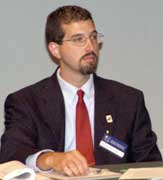 Randy Kixsmiller, a resident of Linn where a pig CAFO was denied, tried to be stoic after being barraged with questions regarding what it took to get MoArk's CAFO permit denied. Kixmiller is the MDNR representative for the water protection and soil conservation division, water pollution control program.
Randy Kixsmiller, a resident of Linn where a pig CAFO was denied, tried to be stoic after being barraged with questions regarding what it took to get MoArk's CAFO permit denied. Kixmiller is the MDNR representative for the water protection and soil conservation division, water pollution control program.
Lang Franks - He asked who the DNR answers to and what does it take to deny this permit?
Gary Wheeler - He represented the Missouri Corn Grower's Association and the Southwest Missouri corn producers. He praised MoArk and accused the expansion opponents of interfering with their prosperity.
Dave Boyt - He called attention to the area's excess humidity in rendering useless MoArk's drying process for the litter. He said there were excessive flaws in the way litter is handled.
John Felder - Speaking on behalf of his two small children, he called for more preventative measures, unbiased checking and punitive damages. He called quarterly inspections ridiculous and said that unannounced inspections should be performed monthly. He called our streams "our lifeblood" and said that big business "must be held to higher standards" rather than allowing them to do as they pleased.
Robert Elliott - He inferred that most of the jobs at MoArk were for Latinos. He said his family lived in the area for 6 generations and that he didn't want to have to speak Spanish to one another.
Dennis Roark - He addressed his remarks to the corn growers' representative. "You want MoArk in your backyard. What's going to happen to the corn association when there's no water?" he asked.
Roxanne Weldon - She represented Seneca's interest in the dropping level of the water table and cited the hazards to fish and wildlife. She called attention to growth hormones and antibiotics fed to chickens and how female children were getting their periods at a very young age due to ingestion of these products.
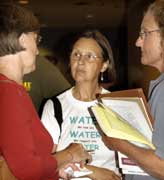 Rebecca Jim (center) is comparing notes with two environmentalists before the formal hearing. She heads the Local Environmental Action Demanded (L.E.A.D.) Agency, a non-profit corporation that in part takes action to counter environmental hazards that put Northeast Oklahoma's residents at risk both physically and financially. The agency's efforts our enhanced by partnering with other environmental organizations throughout Oklahoma and the nation.
Rebecca Jim (center) is comparing notes with two environmentalists before the formal hearing. She heads the Local Environmental Action Demanded (L.E.A.D.) Agency, a non-profit corporation that in part takes action to counter environmental hazards that put Northeast Oklahoma's residents at risk both physically and financially. The agency's efforts our enhanced by partnering with other environmental organizations throughout Oklahoma and the nation.
Rebecca Jim - She is a spokesperson for L.E.A.D. in Oklahoma. She said she represented the "downstream" people and asked for a 90-day extension for public comment. She called this an "environmental justice issue" and plans to ask for assistance from the Oklahoma attorney general. She called for a "plan for 7 generations," or how native Americans would respect the environment.
Joel Mc Grew, a representative of the Concerned Citizens for Green Country Conservation of Grove, OK, called the MDNR a "political institution" with a "bad record." He said that jobs and progress could be maintained without losing site of their role as a steward for clean air, land and water.
Name? - A representative of small trucking firms told how MoArk stayed with them.
Dr. Marion Weston, warned against the dangers of histoplasmosis, a disease that can affect the eyes, caused by fungus from chicken litter.
Les Bond - He noted that there was a bottle of water in front of James Dwyer, the hearing officer, and said that everyone would have the expense of buying water if MoArk's long track record of polluting the environment weren't stopped.
Riley Needham - He has a PhD in engineering sciences and reiterated criticism of the MDNR for their irresponsible actions in the protection of a losing stream area.
Scott Dye - He represents the National Water Sentinels of the Sierra Club. He called attention to the DNR's "clear violation of federal law" and said they had no authority dictating to Oklahoma and Kansas regarding the distribution of litter. With all the copious notes that the MDNR made, Dye asked what was done to preserve water quality. He said there were 46 streams now on the "303 List" and that having one individual [George Parsons] filling the role of inspector for 20 years was not a healthy situation. "When you find yourself in a hole, the first thing you do is put down the shovel," he concluded.
Bill Barry - He asked what they were going to do with all the canoeers who use the streams? He mentioned that trucks stuck 20 yards from the Elk River were not given violations. Point source violators need to be shut down. You can't put a price on the streams, he said.
Bill Horton - He explained how it cost him $80,000 in medical bills as a survivor of histoplasmosis. He wants the MDNR to do right for our children.
Bill Crowe - He attacked the odor problems caused by MoArk. "The stench is so bad it can make you sick," he said. "...I have a right to take a walk without the stink coming from the chicken houses."
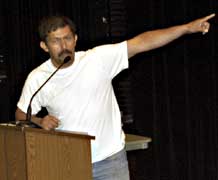 Hugh Avendano points in the direction of MoArk's facility as he gives an impassioned speech regarding protecting the environment.
Hugh Avendano points in the direction of MoArk's facility as he gives an impassioned speech regarding protecting the environment.
Hugh Avendano - He admitted to being a former employee at MoArk. He called himself a "survivor" and he called the U.S. his "land of dreams." He called for a stop to MoArk's destruction of the environment.
Rick Jessee - A Columbus farmer, he said he visited Roggen and found the MoArk operation there "very clean." He called attention to MoArk's contribution to the economy and said that they would make the facility "not as bad as the past." He also said that it "still takes a chicken to make an egg."
Rodney Mein - An agronomy manager, he said that MoArk would be moving the litter responsibly.






Comments